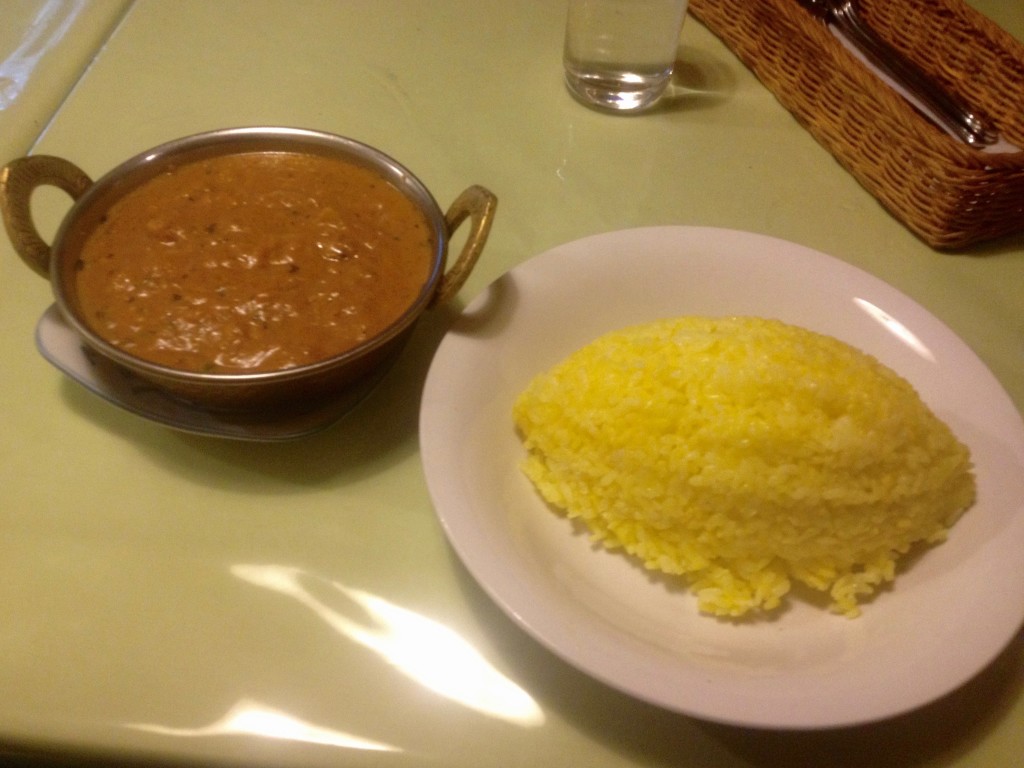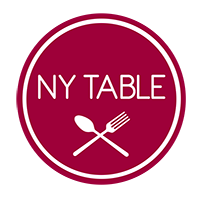
Chicken Curry with Saffron Rice Lunch at Dhrma, around $8. Shinjuku, Tokyo, Japan.
Photo: Sang Woo Kim.
“Dhrma”, a Nepali curry restaurant, opened around the time I arrived in Japan to attend Tokyo’s Waseda University in 2008, just five minutes from school.
“When Dhrma opened, there were very many clients,” said Akira, my friend, who lived right next to the restaurant and few blocks away from my room. I met Akira via Twitter when I was a junior year in college during the time when I started my own documentary film project. He is an artist and performer, but he is most famous for being the first Japanese author to publish an autobiography about his life as a gay sex worker.
Akira moved into the neighborhood two years earlier, and became a fan of Dhrma opened up. He became a fan of this place, and of the manager, a Nepali woman, who was charismatic and spoke accented Japanese.
The curry served in Dhrma was buttery and mild. Most of the time, Akira and I ate chicken curry cooked with either edamame, shimeji or sweet potato. I never got bored with it. It was like an ordinary meal in South Korea, which was where I was from: rice, soup, meat and vegetable.
I was in Korea for mandatory military service when the earthquake struck Tokyo and Tohoku on March 11th 2011, but Akira told me that Dhrma closed temporarily. He visited the restaurant and talked with the manager, who looked worried and depressed. Numerous foreigners in Tokyo fled back to their hometowns, worried that a second Chernobyl might happen because of damage to the Fukushima Daiichi plant.
Yet a week later, Dhrma opened up again and Akira noticed some changes. The manager had a smile on her face. She told Akira that she went to Tohoku to cook naan for displaced refugees who lost their homes in the tsunami, and the experience had erased her depression and anxiety.
After the earthquake in March 2011, xenophobic hate speech became rampant in Japan. Akira and his friends raised cards that read “Let’s be Friends” whenever the hate speech mob passed through the Korean neighborhood.
I graduated in 2015, and I had a grace period of only three months before I had to leave Tokyo. I chose to edit my documentary film, which I had worked on for two years, giving up any hope of finding a job in Tokyo instead.
On the morning of the LGBT Parade in Tokyo, two weeks before submitting my documentary film to the Yamagata Documentary Film Festival, I visited Akira’s flat to share a taxi ride to Shibuya, where the parade started.
There I met Bubu de la Madeline, who was visiting from Tokyo. Bubu was an artist and a former art college instructor, but she was known more for her advocacy for sex workers in Japan. Bubu was her drag queen name, and she was known for sitting on a chair onstage, naked, and pulling a string of silk flags from her vagina. That day, Bubu was invited to ride on a truck to lead the parade.
When I first met her in Akira’s room, Bubu asked if I could unzip her back of her dress so that she could try on another drag costume before the parade.
“You are the first woman that I have taken the clothes off of,” I told her. We instantly became friends.
The next day, Bubu visited my room and I told her that I was confused about whether I am a journalist, as I joined numerous anti-nuclear and anti-fascist protests when I was a college student.
Bubu told me that “a journalist should learn to dance on the street,” referring to how I enjoyed the parade held the day before. Her words comforted me a lot.
Bubu stayed a few days more. Since Bubu was staying at Akira’s place, we had our lunch and dinner at Dhrma for days. We had our usual curry of the day, tandoori chicken and chai.
At the last meal before Bubu returned to Nara, the owner of the restaurant asked whether we were a family, seeing we are so close together. We laughed. Akira and Bubu indeed were like spiritual parents for me; the two drag queens taught me how to live. The curry was our family dinner.

Your Comments